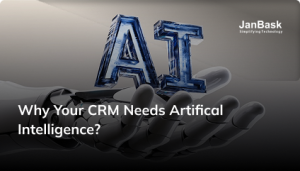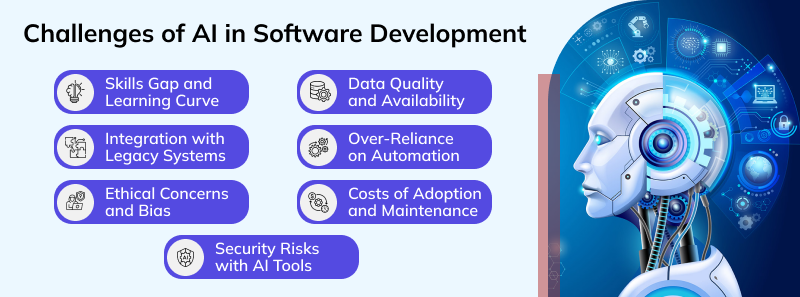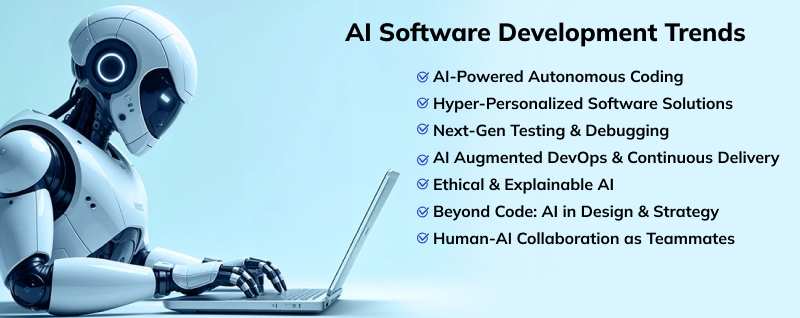
The world of software is evolving faster than ever, and businesses are under constant pressure to deliver smarter, faster, and more reliable solutions. This is where AI in software development is proving to be a real game changer. Far from being a futuristic concept, it is actively transforming how applications are designed, tested, and deployed.
When we talk about the benefits of AI in software development, we aren’t just referring to automation. The real value lies in how teams can reduce errors, speed up release cycles, and deliver more personalized digital experiences. From intelligent coding assistants that simplify programming tasks to predictive analytics that support better decision-making, artificial intelligence software development is unlocking efficiencies that were once unimaginable.
This blog will also explore the broader impact of AI on software development—how it is reshaping productivity, quality, and cost efficiency, while setting new benchmarks for innovation. More importantly, you’ll discover how organizations can adopt AI for software development responsibly, measuring its business value while avoiding common pitfalls.
Adopting AI in software development is more than just a trend—it’s a competitive necessity. From faster coding and smarter testing to predictive analytics and stronger security, AI reshapes how teams build, scale, and maintain applications. Below are the key benefits driving its widespread adoption.

One of the strongest benefits of AI in software development is its ability to accelerate delivery timelines. AI-powered code generators and intelligent assistants can draft repetitive sections of code, suggest real-time improvements, and even auto-complete functions. This drastically reduces the time spent on routine tasks.
For example, tools like GitHub, Copilot or Tabnine allow developers to finish projects up to 40% faster by eliminating repetitive work. The impact of AI on software development here is twofold: shorter release cycles and the agility to adapt quickly to market changes. Businesses no longer need to wait months to roll out new features. AI helps them respond to customer demands almost immediately, strengthening competitiveness.
Human oversight is valuable, but even experienced developers can miss small issues in large codebases. This is where artificial intelligence software development adds significant value. AI-driven testing frameworks can scan thousands of lines of code in seconds, detecting anomalies that might take hours to find manually.
AI also enables predictive error detection. By analyzing patterns from past bugs, systems can flag potential issues before they occur. For instance, AI-based testing can simulate thousands of user interactions, uncovering security gaps or performance problems early in the cycle. This not only improves code quality but also reduces downtime, customer complaints, and long-term maintenance costs.
When discussing AI for software development, cost efficiency is often underestimated. Savings come not only from faster delivery but also from reducing post-release fixes, automating documentation, and minimizing manual QA testing.
For example, AI-enabled project management tools can predict delivery delays or resource constraints, allowing managers to reassign developers before bottlenecks occur. Over time, these efficiencies add up to significant budget savings. Automation also frees engineers to focus on innovation instead of repetitive coding tasks, maximizing human capital.
Predictive analytics is another powerful advantage of AI. By analyzing past project data, AI models can forecast delivery timelines, potential bugs, and areas of technical risk. This shifts development from a reactive to a proactive process.
For instance, predictive insights can estimate how a new feature might affect performance or identify modules prone to errors. These data-driven forecasts help managers plan more effectively, allocate resources, and reduce surprises during development.
AI doesn’t replace developers—it empowers them. Repetitive tasks like code formatting, syntax lookups, or debugging can drain creativity. With AI in software development, engineers gain smart assistants for instant documentation, natural language queries, and automatic error resolution.
This boosts productivity while also improving the developer experience. New team members can onboard faster with AI tools that explain code in plain English. Senior engineers, meanwhile, can focus on architecture and innovation rather than micromanaging syntax. The result is stronger collaboration, reduced burnout, and a more rewarding work environment.
Security vulnerabilities can cause serious financial and reputational harm. AI is becoming a trusted ally in this space. Continuous monitoring powered by AI scans every commit for risks and ensures applications stay compliant with data protection standards.
Models trained on past cyberattacks can detect threats like injection attempts or unusual API activity before damage occurs. For industries like healthcare and finance, the additional protection provided by AI is invaluable.
As applications grow, so does the challenge of maintaining them. Without proper management, technical debt slows innovation. AI addresses this by predicting maintenance needs before they escalate.
For example, AI can analyze system logs and usage data to recommend scaling decisions automatically. It can identify components at risk of becoming bottlenecks and suggest fixes before users are affected. By embedding AI into DevOps pipelines, companies can ensure continuous updates, smooth scaling, and sustainable long-term maintenance.
Contact us today to see how AI can transform your software projects!
The real value of artificial intelligence in software development becomes clear when we examine how different industries are applying it today. Below are practical examples that showcase the impact of AI on software development in action.
In healthcare, where accuracy is critical, AI-powered testing tools help developers build applications with fewer bugs and stronger security. For instance, AI can validate medical record systems by running millions of simulated scenarios, ensuring compliance with HIPAA regulations. The benefits of AI in software development here include faster deployment of life-saving platforms, reduced error rates in patient data handling, and secure telemedicine applications that patients can trust.
The financial industry depends on real-time data. Developers building fintech apps integrate predictive analytics into transaction systems, allowing them to flag fraudulent behavior within seconds. AI-driven algorithms also streamline compliance reporting, cutting down processes that once took weeks into just hours. The result: safer platforms, stronger customer confidence, and measurable cost savings.
AI-driven recommendation engines are a prime example of artificial intelligence software development in action. Platforms like Amazon and Shopify use AI models to suggest products, optimize search results, and predict shopping behavior. For developers, this means creating smarter systems that adapt to user interactions—directly boosting sales, engagement, and customer loyalty.
Software-as-a-Service (SaaS) companies handle high user volumes and complex systems. By leveraging AI for software development, teams can monitor usage patterns, flag unusual activity, and even predict system failures. AI also powers chatbots for customer support, streamlines upgrades, and helps maintain uptime—ensuring users enjoy seamless service while developers focus on innovation instead of troubleshooting.
In the gaming sector, developers employ AI in software development to create adaptive non-player characters (NPCs) and personalized gameplay experiences. AI also accelerates testing for game mechanics, cutting development cycles for complex titles. The outcome is clear—more immersive experiences for players and faster delivery of high-quality games.
Adopting AI in software development is exciting, but without measurable outcomes, it’s difficult to prove value. Leaders should track specific KPIs that highlight the impact of AI on software development across speed, quality, cost, security, and user experience. Below are the most important metrics to evaluate success.
One of the clearest benefits of AI in software development is faster release timelines. Key metrics include:
If AI tools reduce documentation, automate debugging, or accelerate testing, these numbers will show clear improvements.
AI-powered testing frameworks help minimize bugs and vulnerabilities. Metrics to monitor:
When intelligent development tools are integrated, these numbers trend downward, showing higher-quality output.
The financial benefits of AI-driven development can be measured through:
This shift enables businesses to save both time and money.
AI improves the developer experience as much as delivery speed. Companies can track:
These KPIs highlight how AI for software development enhances efficiency and reduces burnout.
In regulated industries like healthcare and finance, compliance is critical. Metrics include:
Here, AI-powered systems strengthen both security and trust.
The ultimate test of artificial intelligence in software development is customer satisfaction. Key metrics:
When AI-driven personalization and smoother releases improve customer experience, these metrics rise.
While the benefits of AI in software development are compelling, adopting these technologies also presents challenges that organizations must prepare for. Ignoring these hurdles can undermine the long-term impact of AI on software development, leading to inefficiencies or even failed projects. Below are the key risks and trade-offs every business should consider.

Implementing AI in software development requires specialized expertise in machine learning, data engineering, and model integration. Many teams lack these capabilities, creating reliance on external vendors or costly training programs. Without structured upskilling, adoption slows down and project expenses rise.
The success of artificial intelligence software development depends on high-quality, unbiased data. Poor or incomplete datasets can lead to unreliable outputs. For instance, an AI-powered testing tool may miss vulnerabilities if training data doesn’t reflect real-world conditions. Robust pipelines and strong governance are essential to ensure dependable outcomes.
Organizations still operating on outdated infrastructure often struggle to integrate modern AI tools. The process can be costly and may require workflow redesigns or platform upgrades. For smaller teams, this trade-off between innovation and practicality can slow adoption.
Automation is one of the strongest advantages of AI and software development, but depending on it too heavily can be risky. If teams fully trust AI-generated code or testing without human review, critical errors may slip through. AI should support human judgment, not replace it. A “human-in-the-loop” approach ensures accountability.
AI systems can unintentionally reflect biases present in their training data. In applications for finance, healthcare, or recruitment, this can lead to unfair or unsafe outcomes. The impact of AI on software development here extends beyond technology—it affects ethics, fairness, and trust. Responsible AI practices are vital to avoid reputational risks.
Adopting artificial intelligence in software development is not a one-time investment. Beyond initial setup, organizations must budget for ongoing infrastructure, updates, and monitoring. Models require regular fine-tuning to stay accurate, creating a long-term financial commitment.
While AI strengthens software security, it also introduces new vulnerabilities. AI models can be manipulated through adversarial attacks or targeted by malicious actors. Companies adopting AI for software development must apply the same rigorous protections to AI systems as they do to traditional applications.
Adopting AI in software development isn’t just about installing tools—it’s about creating the right culture, workflows, and roadmap. To unlock the true benefits of AI in software development, organizations need strategies that balance innovation with responsibility. Below are proven best practices for long-term success.

Instead of overhauling the entire pipeline, begin with smaller projects that deliver clear ROI. For example, test AI in areas like automated bug detection or documentation before scaling to predictive analytics. These pilots build internal confidence and highlight what works best for your team.
The impact of AI on software development depends on people as much as technology. Upskill developers in machine learning basics, prompt engineering, and AI-driven coding. Encourage collaboration between engineers, data scientists, and analysts to align technical capabilities with business goals.
Also, partnering with seasoned software development services can help organizations avoid common pitfalls when integrating AI ensuring that pilot projects are technically sound and scalable.
Automation is powerful, but human oversight is essential. Developers should validate AI-generated code, test outcomes, and predictions. This hybrid model ensures that artificial intelligence software development remains reliable, accountable, and safe.
AI thrives on data quality. Organizations adopting artificial intelligence in software development must enforce governance policies for accuracy, privacy, and security. Regular audits prevent bias, outdated information, and compliance issues—ensuring ethical, trustworthy results.
One common pitfall in AI and software development is attempting a full-scale rollout too quickly. A step-by-step approach works best: start with AI-powered documentation or code reviews, then expand to DevOps automation. This gradual integration reduces resistance and ensures smoother adoption.
AI introduces new risks, so security cannot be an afterthought. Embed compliance checks into every workflow, whether for GDPR, HIPAA, or industry-specific standards. Proactive monitoring ensures that the benefits of AI in software development aren’t overshadowed by hidden vulnerabilities.
AI adoption is an ongoing journey, not a one-time event. Track KPIs like cycle time, defect density, and developer satisfaction to evaluate progress. Use these insights to fine-tune processes so AI for software development continues to deliver value over time.
The adoption of artificial intelligence in software development is still in its early stages. As technology evolves, its role will expand from accelerating coding tasks to transforming how entire ecosystems are built, tested, and scaled. Below are the trends shaping the future impact of AI on software development.

Today’s assistants generate snippets of code. The next step is platforms that can build full applications with minimal input. These autonomous coding systems could dramatically cut development time, making AI for software development indispensable across industries.
Future applications will adapt in real time to user behavior. Organizations that embrace artificial intelligence software development will deliver hyper-personalized experiences at scale, giving them a competitive advantage in dynamic markets.
AI-driven testing will shift from identifying bugs to predicting them before they appear. This proactive debugging approach will make systems more resilient, reducing maintenance costs and downtime.
DevOps pipelines will evolve with AI-driven monitoring, automated scaling, and performance optimization. This ensures software is delivered not only faster but also more sustainably—extending the long-term benefits of AI in software development.
As AI systems gain influence, transparency and accountability will be critical. Future regulations will demand explainable models free from bias. Companies investing in responsible AI and software development today will build trust and avoid compliance risks tomorrow.
AI’s influence won’t stop at coding. It will enhance project management, product design, and user research by analyzing market trends and customer sentiment. This shift enables smarter decision-making from the earliest stages of development.
Rather than replacing developers, AI will act as a digital teammate—handling repetitive tasks while humans focus on creativity and complex problem-solving. This synergy will redefine productivity in the software industry.
The benefits of AI in software development are already reshaping the industry. From faster coding cycles to predictive testing, smarter DevOps practices, and expert AI consulting services, the impact of AI on software development is undeniable—it enhances efficiency, improves quality, and fuels innovation all at once.
Adopting AI for software development doesn’t replace developers—it empowers them. By automating repetitive tasks, AI frees teams to focus on creativity, problem-solving, and building software that truly meets user needs. With the right AI consulting services, businesses can unlock tailored strategies, seamless integration, and long-term value. This collaboration between human expertise, machine learning, and professional consulting guidance is what makes artificial intelligence software development so transformative for the future.
Stop, read and acquire deep insights into complex issues
© 2025 Copyright - JanBask.com | Designed by - JanBask Digital Design
Write a Comment